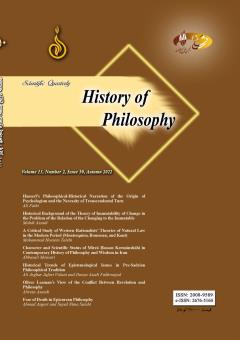-
-
List of Articles
-
Open Access Article
1 - Editor's NOte
Hossein Kalbasi Ashtari -
Open Access Article
2 - Husserl’s Philosophical-Historical Narration of the Origin of Psychologism and the Necessity of Transcendental Turn
Ali Fathi -
Open Access Article
3 - Historical Background of the Theory of Immutability of Change in the Problem of the Relation of the Changing to the Immutable
Mahdi Assadi -
Open Access Article
4 - A Critical Study of Western Rationalists’ Theories of Natural Law in the Modern Period (Montesquieu, Rousseau, and Kant)
Mohammad Hossein Talebi -
Open Access Article
5 - Character and Scientific Status of Mīrzā Ḥassan Kermānshāhī in Contemporary History of Philosophy and Wisdom in Iran
Abbasali Mansori -
Open Access Article
6 - Historical Trends of Epistemological Issues in Pre-Sadrian Philosophical Tradition
Ali Asghar Jafari Valani Donya Asadi Fakhrnejad -
Open Access Article
7 - Oliver Leaman’s View of the Conflict Between Revelation and Philosophy
Alireza Asaadi -
Open Access Article
8 - Fear of Death in Epicurean Philosophy
Ahmad Asgari Seyednima Salehi
-
The rights to this website are owned by the Raimag Press Management System.
Copyright © 2017-2026







